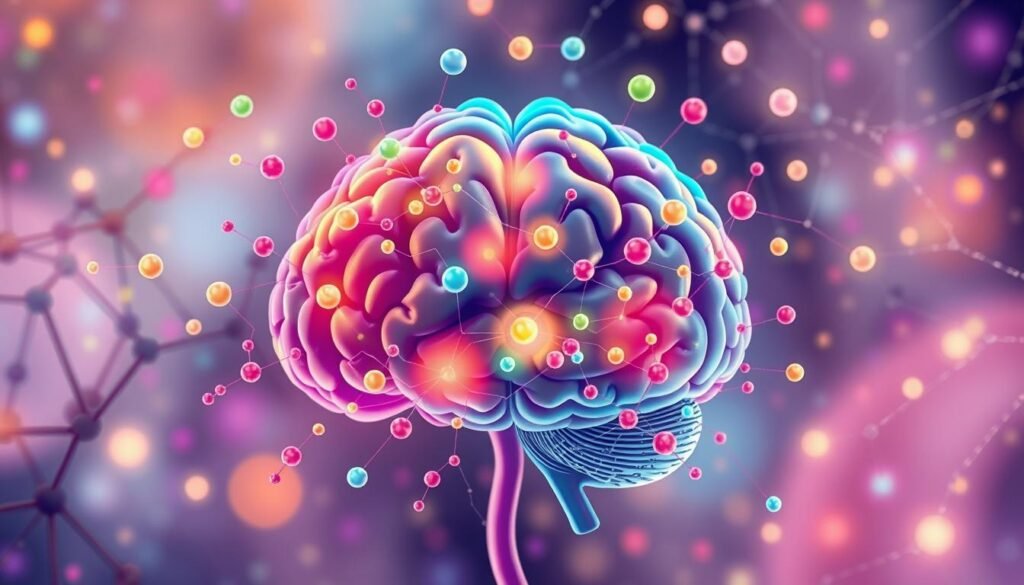Over 40 million adults in the U.S. experience anxiety each year. It’s the top mental health issue in the nation. Understanding anxiety treatment options is crucial. Medications play a key role in treatment. This guide covers the main anti-anxiety drugs, their uses, and possible side effects.
A tailored treatment approach is key, as everyone’s needs are different. The Anxiety and Depression Association of America (ADAA) highlights SSRIs and SNRIs as top choices. It’s important to explore all anxiety treatment options for the best care. This guide will review many medications and additional therapies. It aims to help individuals find the path to recovery.
Key Takeaways
- Anxiety disorders affect over 19% of the U.S. population.
- SSRIs are commonly prescribed as the first-line treatment for anxiety.
- Personalized treatment approaches are essential for effective anxiety management.
- Benzodiazepines may provide quick relief but come with dependency risks.
- Consultation with a healthcare professional is crucial before altering medication regimens.
Understanding Anxiety Disorders
Anxiety disorders are very common in the United States. Many people find these disorders greatly impact their life. Generalized anxiety disorder (GAD) is one of the most common types. It involves constant, excessive worry that people can’t control, disrupting daily activities.
There are several key symptoms of anxiety seen in GAD. These symptoms often include feeling restless, getting easily irritated, and feeling tired a lot.
- Restlessness
- Irritability
- Fatigue
It’s important to recognize these symptoms. But, only a healthcare professional should make a diagnosis. They do a detailed check to tell anxiety disorders apart from other issues with similar symptoms of anxiety. Getting the right diagnosis means getting the right treatment.
Overview of the Top Medications for Anxiety
Anxiety disorders affect millions of adults in the United States every year. There are many anxiety meds out there, each meant for different symptoms and issues. Among these, SSRIs and SNRIs are often chosen first because they work well and are safe for most.
Benzodiazepines are also common for treating anxiety. Drugs like Alprazolam and Lorazepam work fast but are for short-term use only. They can lead to tolerance and dependence. Doctors always watch for side effects like sleepiness and stumbling. It’s important for people to talk to their doctors to find what works best for them.
Knowing what works to treat anxiety can really help people handle it themselves. For more info on anxiety meds and how to use them right, check out this source and other articles about prescription anxiety drugs.
Managing anxiety can also mean therapy, changing your lifestyle, and taking care of yourself. New studies show more options, helping us learn about different anxiety meds and how they affect our mental health.
The Role of Anti-Anxiety Drugs
Anti-anxiety drugs are crucial for managing anxiety. Many people depend on these meds to better their lives. Antidepressants are especially noted for their ability to ease anxiety symptoms. Understanding the kinds of drugs and how they work is key for anyone looking at treatment options.
What are Antidepressants?
Antidepressants like SSRIs and SNRIs are often used to fight anxiety. They mainly change how brain chemicals work. SSRIs boost serotonin levels, while SNRIs increase serotonin and norepinephrine. This uplifts mood and lowers anxiety. Usually, it takes a few weeks to feel the effects, as anxiety slowly gets better.
How Anti-Anxiety Drugs Work
Anti-anxiety meds work by targeting brain chemicals. They improve signaling of serotonin and norepinephrine, helping to ease distress. It might take some time for the initial effects. Yet, long-term use can greatly enhance mental health. Doctors often recommend taking antidepressants for six to twelve months to maintain their benefits and avoid a relapse.
| Type of Medication | Mechanism of Action | Common Side Effects |
|---|---|---|
| SSRIs | Increases serotonin levels | Nausea, weight gain, sexual dysfunction |
| SNRIs | Increases serotonin and norepinephrine levels | Dizziness, sweating, headaches |
| Benzodiazepines | Enhances GABA activity | Drowsiness, dependency, withdrawal symptoms |
While anti-anxiety meds greatly aid in managing anxiety, observing their side effects is important. It’s crucial to talk with healthcare providers about treatment plans. This ensures a well-rounded approach to treating anxiety disorders.
Benzodiazepines: Quick Relief for Acute Anxiety
Benzodiazepines offer quick help for those with intense anxiety. They’re usually given for brief anxiety control, like during panic attacks or high-stress times. While they’re good at easing anxiety, understanding their risks is key.
Common Types of Benzodiazepines
Several kinds of benzodiazepines are used for anxiety. Here are some common ones:
- Alprazolam (Xanax): Often given for anxiety and panic.
- Clonazepam (Klonopin): Used for anxiety and seizures.
- Diazepam (Valium): Mainly for anxiety and muscle spasms.
- Lorazepam (Ativan): Chosen for short anxiety control.
Potential Risks and Side Effects
Benzodiazepines have downsides despite their uses. Some common side effects are:
| Side Effect | Description |
|---|---|
| Drowsiness | Feeling very sleepy or tired. |
| Sedation | Strong calming effects. |
| Dizziness | Feeling weak or faint. |
| Loss of Balance | Higher chance of falls. |
Long-term benzodiazepine use increases risks, leading to addiction and withdrawal symptoms like headaches, insomnia, and shakes. In serious cases, people could have seizures or delirium. Always talk to a doctor before changing your benzodiazepine use, especially after using it a long time.

Selective Serotonin Reuptake Inhibitors (SSRIs)
SSRIs are often the first choice for treating many anxiety disorders. They are preferred because they usually have fewer side effects than other antidepressants. These drugs increase serotonin in the brain by stopping its reuptake. More serotonin helps improve mood, feelings, and sleep quality.
How SSRIs Alleviate Anxiety Symptoms
SSRIs help people with anxiety by increasing serotonin levels. This decrease in anxiety symptoms helps with various conditions, like generalized anxiety disorder and panic disorder. The starting dose is always low, with changes noted in 2 to 4 weeks. If there’s no improvement in 4 to 6 weeks, the doctor may change the dose or try something new.
Common SSRIs Used for Anxiety Treatment
Many SSRIs are approved by the FDA to treat anxiety, offering several options for treatment. Here’s a table showing some common SSRIs, their brand names, and side effects:
| Generic Name | Brand Name | Common Side Effects |
|---|---|---|
| Citalopram | Celexa | Nausea, headache, sleep issues |
| Escitalopram | Lexapro | Agitation, changes in libido |
| Fluoxetine | Prozac | Upset stomach, nervousness |
| Paroxetine | Paxil | Dizziness, sleepiness |
| Sertraline | Zoloft | Blurred vision, sexual problems |
Side effects like stomach upset and sleep trouble can happen. Regular check-ups with your doctor are key. They make sure the treatment is safe and works well for you.
Serotonin-Norepinephrine Reuptake Inhibitors (SNRIs)
Serotonin-norepinephrine reuptake inhibitors are key for treating anxiety disorders. They work well in boosting mood and reducing anxiety. This happens by blocking the reabsorption of serotonin and norepinephrine in the brain.
Benefits of SNRIs for Anxiety Disorders
SNRIs help a lot with anxiety symptoms. They are good for both anxiety and depression, especially when someone has both. Although it might take a while to see changes, many feel better after using them regularly.
The main upsides of using SNRIs are:
- Less anxiety symptoms
- Better mood balance
- They’re not addictive, so less worry about stopping
- Lots of different ones to find what works best
Popular SNRIs in the Market
Some well-known serotonin-norepinephrine reuptake inhibitors for anxiety include:
| Medication | Brand Name | Primary Use |
|---|---|---|
| Desvenlafaxine | Pristiq | Depression |
| Duloxetine | Cymbalta | Anxiety, chronic pain |
| Levomilnacipran | Fetzima | Depression |
| Venlafaxine | Effexor XR | Anxiety disorders, panic disorder |
While SNRIs help a lot with managing anxiety, they can have side effects like nausea or dizziness. It’s important to understand both the good and the possible bad when choosing SNRIs for treatment.

Buspirone: A Non-Addictive Anxiety Treatment
Buspirone is a good choice for those wanting to treat anxiety without addiction risks. It works differently, focusing on the brain’s serotonin receptors. Because it’s not like benzodiazepines or barbiturates, it doesn’t lead to dependency.
Doctors prescribe it for managing generalized anxiety disorder (GAD). Patients usually take it twice a day. They might increase their dose every 2 to 3 days. It can take a few weeks to fully work.
Side effects like dizziness, nausea, and headaches can happen. But more serious issues, such as rashes or irregular heartbeats, are also possible. Monitoring these symptoms is crucial. If you’re considering this non-addictive anxiety medication, keep it at room temperature. Also, watch out for overdose signs including drowsiness and vomiting.
Buspirone is a dependable alternative for those needing treatment for anxiety but worried about addiction. Its unique benefits make it worth talking about with a doctor, especially if other treatments haven’t worked.
Beta-Blockers for Physical Anxiety Symptoms
Beta-blockers are gaining attention for easing anxiety’s physical effects, like a fast heart rate and shaking. This is especially true in stress-filled moments. These medications are becoming a go-to for many facing short-term, event-driven anxiety.
Mechanism of Action
Beta-blockers, for example, propranolol and atenolol, block adrenaline’s effects. This can lessen anxiety’s physical signs. By stopping adrenaline, these drugs keep the body calm under stress. Studies show propranolol can quickly reduce anxiety, similar to benzodiazepines. They can provide relief in about an hour, helping swiftly in stressful times.
Common Beta-Blockers Prescribed
There are many beta-blockers, but some are mostly used for anxiety-related symptoms:
| Beta-Blocker | Usage | Notes |
|---|---|---|
| Propranolol | Performance Anxiety | Often favored by psychiatrists for quick relief. |
| Atenolol | Short-term Anxiety | Effective for managing physical symptoms. |
| Metoprolol | General use | Widely prescribed for various conditions. |
| Nadolol | Long-acting treatment | Maintains effects over extended periods. |
| Bisoprolol | Arrhythmias & Anxiety | Good choice for individuals with heart issues. |
Beta-blockers are good at reducing anxiety’s physical signs but may not be the best for long-term issues like GAD or social fears. It’s key to talk with a healthcare expert if you have asthma or diabetes since beta-blockers might not be a good choice. Remember to consider possible side effects like tiredness, headaches, and feeling dizzy. This helps make a well-informed choice about using them for anxiety.
Hydroxyzine: An Antihistamine Option
Hydroxyzine, or Vistaril®, is a top choice for an antihistamine treatment for anxiety. It’s not just for allergies; it also helps ease anxiety. People like it because it’s not addictive and brings calm.
Different forms of hydroxyzine are out there. You can get capsules, tablets, syrup, or a solution. Each form comes in various strengths. It’s great because it’s not considered a controlled substance, so there’s less worry about addiction.
The effectiveness of hydroxyzine can be seen quickly. It does have some side effects like feeling dizzy or sleepy. If you have severe reactions like an allergy or fast heartbeat, get help right away.
If thinking about hydroxyzine for anxiety, talk to a doctor. This is especially true for pregnant or breastfeeding moms, as it could affect the baby. Safety and effectiveness are key.
Hydroxyzine is a solid choice for quick anxiety relief without a high addiction risk. For those looking at their options, it offers a good balance as part of a wider anxiety treatment plan.
| Formulation | Strengths | Common Use |
|---|---|---|
| Hydroxyzine Pamoate Capsules | 25 mg, 50 mg, 100 mg | Short-term anxiety relief |
| Hydroxyzine HCl Tablets | 10 mg, 25 mg, 50 mg | Short-term anxiety relief |
| Syrup | 10 mg/5 mL | Short-term anxiety relief |
| Oral Solution | 25 mg/mL, 50 mg/mL | Short-term anxiety relief |
Treatment Options Beyond Medications
Exploring other ways to deal with anxiety could make a big difference. Blending talk therapy with coping skills is a full approach to lessen symptoms. Talk therapy for anxiety is effective, giving people the means and understanding to deal better.
Psychotherapy as a Complementary Treatment
Cognitive behavioral therapy (CBT) is a top method for treating anxiety. It works by helping people change harmful thinking patterns, which lets them control anxiety every day. Other therapies, like those based on mindfulness, also help lessen anxiety. Combining these therapies with medicines often results in better health.
Self-Care and Coping Strategies
Coping methods are key in controlling anxiety symptoms. Making changes in your lifestyle can really lower your anxiety. Strategies include:
- Regular physical activity
- Adequate sleep
- Healthy eating
- Avoiding alcohol and caffeine
- Practice of relaxation techniques
These habits lead to stable emotions and more resilience. Also, being part of support groups and staying connected with friends and family can boost your spirit and combat loneliness. It’s important to be careful with herbal treatments as more research is needed on them. Writing in a journal to track what sets off your anxiety and how you react can help you find personal ways to cope.

Conclusion
Anxiety disorders impact around 40 million Americans at some point in their lives. This discussion sheds light on various anxiety medications like SSRIs, SNRIs, and non-addictive options. Each type has its own way of working and side effects. Alongside, treatments like cognitive-behavioral therapy (CBT) play a key role in a well-rounded management plan.
Effective anxiety management is not just about taking pills. It involves a tailor-made plan that includes both drug and non-drug strategies. Biological and psychological treatments have a success rate of 60% to 85%. Around half of those treated reach a point where symptoms are minimal. This shows how critical personalized care is for the best results. For a detailed look at anxiety meds, check out this article.
If you’re facing anxiety or similar issues, it’s vital to seek help from healthcare experts. A variety of options exist, from medication and self-help strategies to therapy. With the right support, finding your way back to health is possible. Pairing treatments with lifestyle habits like mindfulness and exercise can boost your ability to manage anxiety.